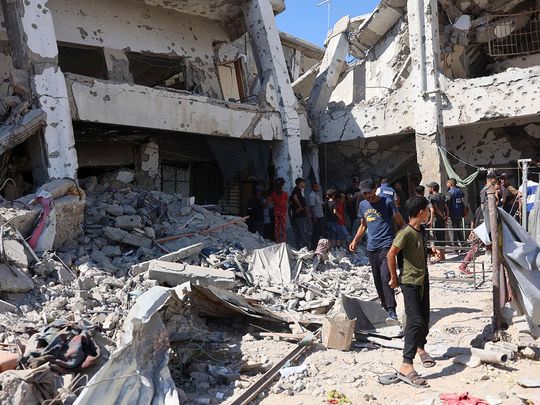
Israel’s war on Gaza will not end anytime soon. This is the dismal outcome of US Secretary of State Antony Blinken’s latest visit to the region. We are no closer today to a ceasefire in Gaza than we were a month, two or three months ago.
The war has polarised the world, brought the international order to its heels, and undermined US foreign policy in the region. If anything, the last 11 months have delivered one stern reality: Israeli Prime Minister Benjamin Netanyahu is in the driver’s seat, and he is pushing the Middle East to a precipice.
The Israeli leader has been derailing all efforts to reach a deal that would end the war, free Israeli captives, and pave the way for the long and painful process of Gaza reconstruction. He is against all three goals. He is manipulating the Biden administration in a controversial election year with a straightforward objective: prolong the war until after the US presidential elections.
By doing so, he hopes to keep his far-right coalition alive and rein in Hezbollah and Iran through the presence of the largest number of US battle groups in the Eastern Mediterranean since the 2003 invasion of Iraq, all while decimating the Gaza Strip and its 2.2 million inhabitants.
The region has been on edge since 7 October. The US has wavered in its approach towards Israel. Iran and its proxies have stepped in to engage Israel under the guise of supporting Hamas and the resistance. All parties have now been sucked into a dangerous vortex of high-stakes confrontation.
Pursuing a deadly war
It is only natural that America’s allies have looked to Washington for some courageous and moral leadership — both were missing on this occasion. The Biden administration has been saying something and doing the opposite. It’s been calling for a ceasefire while giving Netanyahu the political and military cover he needs to pursue a war that even his generals now say has no military sense anymore.
The Americans admit that Netanyahu is yet to deliver a workable day-after scenario. They understand the fears of their Arab allies that Netanyahu and his extremist partners are using the war to annex the West Bank and destroy the Palestinian Authority.
But Israel has always been a US domestic issue. In an election year, both parties compete to demonstrate their unconditional support of Israel. No one understands the intricacies of US politics when it comes to backing Israel than Netanyahu.
And while his war on Gaza has damaged Israel’s standing around the world and delivered unprecedented legal liabilities in the international arena, US leaders have been unable, or unwilling, to distinguish between their support of Israel and providing Netanyahu with the military and political backing he needs to continue with his reckless war.
Meanwhile, the Middle East is in a mess. The war in Sudan has destroyed the country, while famine is threatening the lives of millions. Libya remains a divided and crippled state. Iraq is struggling to deal with the bitter legacy of the US invasion and the Iranian meddling in its affairs.
Syria is in a political, economic, security, and humanitarian gridlock. Lebanon is politically and economically paraplegic and could be further weakened if war breaks out between Israel and Hezbollah.
The Israeli assassination of Hamas leader Ismail Haniyeh last month In Tehran on the day a new moderate Iranian president was inaugurated spoiled any chance of warming of ties between Iran and the rest of the world.
Not peace on the horizon
The war on Gaza has underlined the region’s need for a reset. When the war finally ends, the Middle East cannot go back to a business-as-usual state. It is unlikely that the outcome of the US presidential elections will bring positive change to the region. Neither Donald Trump nor Harris will be able to address the complex geopolitical challenges that will haunt the area once the Gaza war ends.
The two-state solution is dead; the West Bank is being carved into enclaves, with Israeli settlers now calling the shots. A war against Iran could quickly spiral into a global war.
The failures of the US Middle Eastern policy over the last 30 years are too many to tally. However, the US remains a powerful and significant player in this region. Its blind support of Israel’s expansionist policies has complicated the issues to the point that most have become intractable. The regional peace that was promised is becoming intangible.
Regional leaders need to send a united message to the next US administration that underlines the need to initiate a reset and restore a sober and responsible dialogue that preserves the interests of the peoples of the Middle East following a chaotic US-led phase that has contributed to regional imbalances, wars and the swell of terrorism.
Netanyahu and his extremist allies must not be allowed to take the entire region hostage while destroying the concept of Palestinian nationhood. The Middle East has never been so close to rampant violence and the spectre of wholesale destruction. The rest of the world must hear such a united message loud and clear.
Osama Al Sharif is a journalist and political commentator based in Amman.








_resources1_16a45059ca3_small.jpg)
